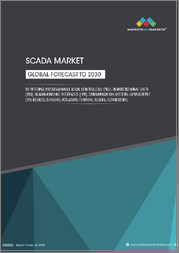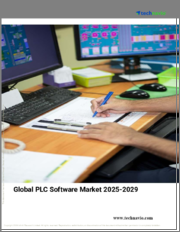
|
시장보고서
상품코드
1679312
마이크로 및 나노 PLC 시장 예측(-2030년) : 유형별, 제공별, 아키텍처별, 통신 프로토콜별, 최종사용자별, 지역별 세계 분석Micro and Nano PLC Market Forecasts to 2030 - Global Analysis By Type (Micro PLCs and Nano PLCs), Capacity, Offering, Architecture, Communication Protocol, End User and By Geography |
||||||
Stratistics MRC에 따르면, 마이크로 및 나노 PLC 세계 시장은 2024년 103억 8,000만 달러로 예측 기간 동안 8%의 CAGR로 성장하여 2030년에는 164억 7,000만 달러에 달할 것으로 예상됩니다.
마이크로 및 나노 PLC(프로그래머블 로직 컨트롤러)라고 불리는 소형 산업용 제어 시스템은 소규모 애플리케이션의 자동화를 위해 만들어졌습니다. 다소 큰 마이크로 PLC는 기본 네트워킹, 기본 제어 작업, 증가된 I/O(입출력) 기능을 제공합니다. 나노 PLC라고 불리는 가장 작은 유형의 PLC는 간단한 로직 제어에 사용되며, I/O가 적고 프로그래밍이 거의 이루어지지 않습니다. 공정 자동화, HVAC, 기계 제어 등의 용도에 적합합니다. 이러한 PLC는 비용, 적응성 및 통합의 단순성 때문에 제한된 공간에서 최소한의 전력 소비로 효과적인 자동화를 원하는 기업에게 매우 중요합니다.
성장하는 산업 자동화
나노 PLC는 자동화된 공정에서 미세한 제어를 가능하게함으로써 생산성을 향상시키고 운영 비용을 절감합니다. 나노 PLC는 제조, 자동차, 식품 가공 등의 분야에서 실시간 모니터링 및 공정 최적화를 위해 점점 더 중요해지고 있습니다. 스마트 제조 및 IoT 통합의 증가 추세로 인해 PLC의 수용이 더욱 가속화되고 있습니다. 또한 시장 확대의 원동력은 설치 공간이 제한된 분야에서 공간 효율적인 제어 솔루션에 대한 요구가 증가하고 있습니다. 마이크로 및 나노 PLC는 자동화가 발전함에 따라 산업 공정의 최적화에 필수적인 요소로 자리매김할 것으로 보입니다.
높은 초기 도입 비용
하드웨어, 소프트웨어, 시스템 통합의 높은 비용으로 인해 많은 기업들이 투자를 망설이고 있습니다. 이러한 시스템의 설치 및 유지보수에는 자격을 갖춘 전문가가 필요하기 때문에 비용은 더욱 증가합니다. 비용에 민감한 분야에서는 선투자가 많으면 투자 회수 기간도 길어지기 때문에 그다지 매력적이지 않습니다. 또한, 신흥국에서는 재정적 제약으로 인해 대규모 도입이 지연되고 있습니다. 그 결과, 기업들은 자동화 개선을 미루거나 기존 제어 솔루션을 사용하는 경우가 많습니다.
스마트 시티에 대한 수요 증가
지능형 조명, 교통 관리 시스템, 스마트 그리드는 모두 이 소형 PLC로 쉽게 제어할 수 있습니다. IoT 및 AI 기반 스마트 시티 이니셔티브에 대한 투자가 확대됨에 따라 PLC의 수용은 더욱 가속화되고 있습니다. 전 세계적으로 정부는 스마트 시티 프로젝트를 최우선 과제로 삼고 있으며, 정교한 자동화 기술에 대한 수요가 증가하고 있습니다.
규제 및 컴플라이언스 과제
지속적인 적응이 필요한 산업법의 빈번한 개정으로 인해 제품 출시가 지연되고 있습니다. 국경을 넘어 사업을 전개하는 제조업체의 경우, 국제 표준 준수는 복잡성을 증가시킵니다. 소규모 기업의 시장 진입은 시간과 비용이 많이 드는 인증 절차로 인해 제한됩니다. 데이터 보안 및 프라이버시 규제는 클라우드 기반과 사물인터넷 디바이스의 통합을 더욱 어렵게 만들고 있습니다. 이러한 장애물은 기술 혁신과 수용을 저해하여 시장 확대를 제한하고 있습니다.
COVID-19의 영향
COVID-19 팬데믹은 공급망 지연, 반도체 부족, 제조 활동 감소로 인해 마이크로 및 나노 PLC 시장을 혼란에 빠뜨렸습니다. 가동 중단과 경기 침체는 산업 자동화 프로젝트에 영향을 미쳐 수요 감소로 이어졌습니다. 그러나 산업이 원격 모니터링 및 자동화에 적응함에 따라 시장은 점차 회복되었습니다. 위기는 디지털 전환을 가속화하고 스마트 제조 및 IoT 애플리케이션을 위한 소형 PLC의 채택을 증가시켰습니다. 팬데믹 이후 자동화 및 인더스트리 4.0에 대한 투자가 증가하면서 시장 성장을 촉진하고 있습니다.
예측 기간 동안 마이크로 PLC 부문이 가장 큰 시장으로 성장할 것으로 예상됩니다.
마이크로 PLC 부문은 소규모 산업을 위한 컴팩트하고 비용 효율적인 자동화 솔루션을 제공함으로써 예측 기간 동안 가장 큰 시장 점유율을 차지할 것으로 예상됩니다. 에너지 산업, 자동차 산업, 산업 산업에서 사용이 증가하고 있으며, 유연성과 운영 효율성이 향상되고 있습니다. 스마트 제어와 실시간 모니터링을 가능하게 하는 인더스트리 4.0과 사물인터넷의 발전으로 소형 PLC에 대한 수요는 더욱 증가하고 있습니다. 클라우드 기반 및 무선 통신 기술과의 통합이 진행됨에 따라 시장에서의 존재감이 커지고 있습니다.
예측 기간 동안 자동차 분야가 가장 높은 CAGR을 보일 것으로 예상됩니다.
예측 기간 동안 최신 자동차의 소형화 및 고성능 자동화 솔루션에 대한 수요 증가로 인해 자동차 분야가 가장 높은 성장률을 보일 것으로 예상됩니다. 전기자동차(EV)와 첨단 운전자 보조 시스템(ADAS)의 정밀 제어에 대한 필요성으로 인해 PLC의 사용이 증가하고 있습니다. 마이크로 및 나노 PLC는 제조업체가 생산 효율성을 높이고 고급 자동차 부품을 보장하기 위해 사용하고 있습니다. 이러한 소형 컨트롤러의 통합은 인더스트리 4.0과 스마트 팩토리의 부상으로 더욱 가속화되고 있습니다.
최대 점유율 지역:
예측 기간 동안 산업 자동화의 증가와 소형 고성능 컨트롤러에 대한 수요로 인해 북미가 가장 큰 시장 점유율을 차지할 것으로 예상됩니다. 제조업, 자동차, 에너지 등 주요 산업이 채택을 촉진하고 있습니다. 미국은 스마트 팩토리에 대한 강력한 기술 발전과 투자로 시장을 선도하고 있습니다. 효율적이고 공간 절약형 솔루션에 대한 수요 증가가 시장 확대의 원동력이 되고 있습니다. 주요 기업들은 기술 혁신, 연결성 강화, 사이버 보안에 집중하고 있습니다. 자동화 촉진에 대한 정부의 노력은 성장을 더욱 촉진하고 있으며, 북미는 마이크로 및 나노 PLC 개발의 주요 거점이 되고 있습니다.
CAGR이 가장 높은 지역:
예측 기간 동안 아시아태평양은 산업 자동화, 스마트 제조, IoT 도입 증가로 인해 가장 높은 CAGR을 보일 것으로 예상됩니다. 중국, 일본, 한국, 인도 등의 국가들이 로봇, 자동차, 전자 분야의 발전으로 수요를 견인하고 있습니다. 인더스트리 4.0과 소형화된 제어 시스템에 대한 투자 증가는 제조업의 효율성을 높이고 있습니다. 자동화를 지원하는 정부 이니셔티브는 시장 확대를 더욱 촉진할 것입니다. 이 지역의 강력한 반도체 산업과 중소기업의 성장은 소형 고성능 PLC의 채택 확대에 기여하고 있습니다.
무료 커스터마이징 서비스:
본 보고서를 구독하는 고객은 다음과 같은 무료 맞춤화 옵션 중 하나를 이용할 수 있습니다:
- 기업 개요
- 추가 시장 기업의 종합적인 프로파일링(최대 3개사까지)
- 주요 기업 SWOT 분석(3개사까지)
- 지역 세분화
- 고객의 관심에 따른 주요 국가별 시장 추정, 예측, CAGR(주: 타당성 검토에 따른)
- 경쟁사 벤치마킹
- 제품 포트폴리오, 지리적 입지, 전략적 제휴를 기반으로 한 주요 기업 벤치마킹
목차
제1장 주요 요약
제2장 서문
- 개요
- 이해관계자
- 조사 범위
- 조사 방법
- 데이터 마이닝
- 데이터 분석
- 데이터 검증
- 조사 접근법
- 조사 정보 출처
- 1차 조사 정보 출처
- 2차 조사 정보 출처
- 가정
제3장 시장 동향 분석
- 성장 촉진요인
- 성장 억제요인
- 기회
- 위협
- 최종사용자 분석
- 신흥 시장
- COVID-19의 영향
제4장 Porter's Five Forces 분석
- 공급 기업의 교섭력
- 구매자의 교섭력
- 대체품의 위협
- 신규 참여업체의 위협
- 경쟁 기업 간의 경쟁 관계
제5장 세계의 마이크로 및 나노 PLC 시장 : 유형별
- 마이크로 PLC
- 나노 PLC
제6장 세계의 마이크로 및 나노 PLC 시장 : 제공별
- 하드웨어
- 소프트웨어
- 서비스
제7장 세계의 마이크로 및 나노 PLC 시장 : 아키텍처별
- 고정 PLC
- 모듈러 PLC
제8장 세계의 마이크로 및 나노 PLC 시장 : 통신 프로토콜별
- 이더넷
- PROFINET
- Modbus TCP
- DeviceNet
- CANopen
- Profibus
- 기타 통신 프로토콜
제9장 세계의 마이크로 및 나노 PLC 시장 : 최종사용자별
- 자동차
- 식품 및 음료
- 의약품
- 에너지·유틸리티
- 석유 및 가스
- 금속·광업
- 화학·석유화학
- 상하수 처리
- 일렉트로닉스 및 반도체
- 물류·창고
- 기타 최종사용자
제10장 세계의 마이크로 및 나노 PLC 시장 : 지역별
- 북미
- 미국
- 캐나다
- 멕시코
- 유럽
- 독일
- 영국
- 이탈리아
- 프랑스
- 스페인
- 기타 유럽
- 아시아태평양
- 일본
- 중국
- 인도
- 호주
- 뉴질랜드
- 한국
- 기타 아시아태평양
- 남미
- 아르헨티나
- 브라질
- 칠레
- 기타 남미
- 중동 및 아프리카
- 사우디아라비아
- 아랍에미리트
- 카타르
- 남아프리카공화국
- 기타 중동 및 아프리카
제11장 주요 발전
- 계약, 파트너십, 협업, 합작투자
- 인수와 합병
- 신제품 발매
- 사업 확대
- 기타 주요 전략
제12장 기업 개요
- IDEC Corporation
- Schleicher Electronic
- DirectLOGIC(Koyo)
- Plessey Semiconductors
- Morse Micro
- Digico Limited
- Siemens AG
- Rockwell Automation
- Mitsubishi Electric Corporation
- Omron Corporation
- ABB Ltd.
- Delta Electronics
- Panasonic Corporation
- Hitachi Ltd.
- Bosch Rexroth AG
- Beckhoff Automation
- Honeywell International Inc.
According to Stratistics MRC, the Global Micro and Nano PLC Market is accounted for $10.38 billion in 2024 and is expected to reach $16.47 billion by 2030 growing at a CAGR of 8% during the forecast period. Compact industrial control systems called micro and nano PLCs (Programmable Logic Controllers) are made for automation in small-scale applications. Slightly bigger, micro PLCs provide basic networking, basic control operations, and increased I/O (Input/Output) capabilities. The smallest type of PLCs, called nano PLCs, are used for simple logic control and frequently have less I/O and little programming. For uses like process automation, HVAC, and machine control, both are perfect. They are crucial for enterprises looking for effective automation in confined places with minimal power consumption because of their cost, adaptability, and simplicity of integration.
Market Dynamics:
Driver:
Growing industrial automation
Nano PLCs improve productivity and save operating costs by enabling fine control in automated processes. They are becoming more and more important for real-time monitoring and process optimisation in sectors including manufacturing, automotive, and food processing. Their acceptance is further accelerated by the growing trend of smart manufacturing and IoT integration. Further driving market expansion is the requirement for space-efficient control solutions in sectors with constrained installation spaces. Micro and Nano PLCs will remain essential for optimising industrial processes as automation develops.
Restraint:
High initial cost of implementation
The high costs of hardware, software, and system integration make many companies hesitant to make investments. Costs are further increased by the requirement for qualified experts to install and maintain these systems. Cost-sensitive sectors find it less appealing since high upfront investments also lengthen the return on investment term. Furthermore, extensive adoption is slowed down in emerging nations by financial restrictions. As a result, businesses frequently postpone automation improvements or use conventional control solutions.
Opportunity:
Growing demand for smart cities
Intelligent lighting, traffic management systems, and smart grids may all be easily controlled with these little PLCs. They are perfect for urban applications with limited space because of their compact size and low power usage. Their acceptance is further accelerated by growing investments in IoT and AI-driven smart city initiatives. Globally, governments are giving smart city projects top priority, which is driving up demand for sophisticated automation technologies.
Threat:
Regulatory & compliance challenges
Product releases are delayed by frequent revisions to industry laws that necessitate ongoing adaption. For producers that operate across borders, adhering to international standards increases complication. Small players' access to the market is restricted by the time-consuming and expensive certification procedures. Regulations pertaining to data security and privacy make integrating cloud-based and Internet of Things devices even more difficult. These obstacles limit market expansion by stifling innovation and acceptance.
Covid-19 Impact
The COVID-19 pandemic disrupted the Micro and Nano PLC market by causing supply chain delays, semiconductor shortages, and reduced manufacturing activities. Lockdowns and economic slowdowns impacted industrial automation projects, leading to decreased demand. However, as industries adapted to remote monitoring and automation, the market saw a gradual recovery. The crisis accelerated digital transformation, increasing the adoption of compact PLCs for smart manufacturing and IoT applications. Post-pandemic, rising investments in automation and Industry 4.0 are driving market growth.
The micro PLCs segment is expected to be the largest during the forecast period
The micro PLCs segment is expected to account for the largest market share during the forecast period by offering compact, cost-effective automation solutions for small-scale industries. Their increasing use in the energy, automotive, and industrial industries improves flexibility and operating efficiency. The need for mini PLCs is further increased by developments in Industry 4.0 and the Internet of Things, which allow for smart control and real-time monitoring. Their market presence is strengthened by greater integration with cloud-based and wireless communication technology.
The automotive segment is expected to have the highest CAGR during the forecast period
Over the forecast period, the automotive segment is predicted to witness the highest growth rate by increasing demand for compact, high-performance automation solutions in modern vehicles. PLC usage is increased by the need for precise control in electric vehicles (EVs) and advanced driver-assistance systems (ADAS). Micro and Nano PLCs are used by manufacturers to increase production efficiency and guarantee premium automobile components. The integration of these small controllers is further accelerated by the emerging trend of Industry 4.0 and smart factories.
Region with largest share:
During the forecast period, the North America region is expected to hold the largest market share due to rising industrial automation and demand for compact, high-performance controllers. Key industries such as manufacturing, automotive, and energy are driving adoption. The U.S. leads with strong technological advancements and investments in smart factories. Increasing demand for efficient, space-saving solutions fuels market expansion. Major players focus on innovation, enhanced connectivity, and cybersecurity. Government initiatives promoting automation further support growth, making North America a key hub for micro and nano PLC development.
Region with highest CAGR:
Over the forecast period, the Asia Pacific region is anticipated to exhibit the highest CAGR, owing to increasing industrial automation, smart manufacturing, and IoT adoption. Countries like China, Japan, South Korea, and India are driving demand with advancements in robotics, automotive, and electronics sectors. Rising investments in Industry 4.0 and miniaturized control systems enhance efficiency in manufacturing. Government initiatives supporting automation further boost market expansion. The region's strong semiconductor industry and growing SMEs contribute to the increasing adoption of compact, high-performance PLCs.
Key players in the market
Some of the key players profiled in the Micro and Nano PLC Market include IDEC Corporation, Schleicher Electronic, DirectLOGIC (Koyo), Plessey Semiconductors, Morse Micro, Digico Limited, Siemens AG, Rockwell Automation, Mitsubishi Electric Corporation, Schneider Electric, Omron Corporation, ABB Ltd., Delta Electronics, Panasonic Corporation, Hitachi Ltd., Bosch Rexroth AG, Beckhoff Automation and Honeywell International Inc.
Key Developments:
In November 2024, IDEC agreed to acquire the remaining 50% stake in IDEC Datalogic Co., Ltd. from Datalogic S.p.A. for approximately ¥130 million. This acquisition aimed to strengthen IDEC's presence in the Japanese market and expand its product portfolio.
In February 2024, IDEC introduced the FT2J Series, a combined PLC and HMI solution designed to streamline industrial automation processes. This product offers a compact form factor, integrating controller features with an advanced seven-inch touchscreen display, thereby reducing panel space requirements and simplifying installation.
Types Covered:
- Micro PLCs
- Nano PLCs
Offerings Covered:
- Hardware
- Software
- Services
Architectures Covered:
- Fixed PLCs
- Modular PLCs
Communication Protocols Covered:
- Ethernet
- PROFINET
- Modbus TCP
- DeviceNet
- CANopen
- Profibus
- Other Communication Protocols
End Users Covered:
- Automotive
- Food & Beverage
- Pharmaceuticals
- Energy & Utilities
- Oil & Gas
- Metals & Mining
- Chemical & Petrochemical
- Water & Wastewater Treatment
- Electronics & Semiconductor
- Logistics & Warehousing
- Other End Users
Regions Covered:
- North America
- US
- Canada
- Mexico
- Europe
- Germany
- UK
- Italy
- France
- Spain
- Rest of Europe
- Asia Pacific
- Japan
- China
- India
- Australia
- New Zealand
- South Korea
- Rest of Asia Pacific
- South America
- Argentina
- Brazil
- Chile
- Rest of South America
- Middle East & Africa
- Saudi Arabia
- UAE
- Qatar
- South Africa
- Rest of Middle East & Africa
What our report offers:
- Market share assessments for the regional and country-level segments
- Strategic recommendations for the new entrants
- Covers Market data for the years 2022, 2023, 2024, 2026, and 2030
- Market Trends (Drivers, Constraints, Opportunities, Threats, Challenges, Investment Opportunities, and recommendations)
- Strategic recommendations in key business segments based on the market estimations
- Competitive landscaping mapping the key common trends
- Company profiling with detailed strategies, financials, and recent developments
- Supply chain trends mapping the latest technological advancements
Free Customization Offerings:
All the customers of this report will be entitled to receive one of the following free customization options:
- Company Profiling
- Comprehensive profiling of additional market players (up to 3)
- SWOT Analysis of key players (up to 3)
- Regional Segmentation
- Market estimations, Forecasts and CAGR of any prominent country as per the client's interest (Note: Depends on feasibility check)
- Competitive Benchmarking
- Benchmarking of key players based on product portfolio, geographical presence, and strategic alliances
Table of Contents
1 Executive Summary
2 Preface
- 2.1 Abstract
- 2.2 Stake Holders
- 2.3 Research Scope
- 2.4 Research Methodology
- 2.4.1 Data Mining
- 2.4.2 Data Analysis
- 2.4.3 Data Validation
- 2.4.4 Research Approach
- 2.5 Research Sources
- 2.5.1 Primary Research Sources
- 2.5.2 Secondary Research Sources
- 2.5.3 Assumptions
3 Market Trend Analysis
- 3.1 Introduction
- 3.2 Drivers
- 3.3 Restraints
- 3.4 Opportunities
- 3.5 Threats
- 3.6 End User Analysis
- 3.7 Emerging Markets
- 3.8 Impact of Covid-19
4 Porters Five Force Analysis
- 4.1 Bargaining power of suppliers
- 4.2 Bargaining power of buyers
- 4.3 Threat of substitutes
- 4.4 Threat of new entrants
- 4.5 Competitive rivalry
5 Global Micro and Nano PLC Market, By Type
- 5.1 Introduction
- 5.2 Micro PLCs
- 5.3 Nano PLCs
6 Global Micro and Nano PLC Market, By Offering
- 6.1 Introduction
- 6.2 Hardware
- 6.3 Software
- 6.4 Services
7 Global Micro and Nano PLC Market, By Architecture
- 7.1 Introduction
- 7.2 Fixed PLCs
- 7.3 Modular PLCs
8 Global Micro and Nano PLC Market, By Communication Protocol
- 8.1 Introduction
- 8.2 Ethernet
- 8.3 PROFINET
- 8.4 Modbus TCP
- 8.5 DeviceNet
- 8.6 CANopen
- 8.7 Profibus
- 8.8 Other Communication Protocols
9 Global Micro and Nano PLC Market, By End User
- 9.1 Introduction
- 9.2 Automotive
- 9.3 Food & Beverage
- 9.4 Pharmaceuticals
- 9.5 Energy & Utilities
- 9.6 Oil & Gas
- 9.7 Metals & Mining
- 9.8 Chemical & Petrochemical
- 9.9 Water & Wastewater Treatment
- 9.10 Electronics & Semiconductor
- 9.11 Logistics & Warehousing
- 9.12 Other End Users
10 Global Micro and Nano PLC Market, By Geography
- 10.1 Introduction
- 10.2 North America
- 10.2.1 US
- 10.2.2 Canada
- 10.2.3 Mexico
- 10.3 Europe
- 10.3.1 Germany
- 10.3.2 UK
- 10.3.3 Italy
- 10.3.4 France
- 10.3.5 Spain
- 10.3.6 Rest of Europe
- 10.4 Asia Pacific
- 10.4.1 Japan
- 10.4.2 China
- 10.4.3 India
- 10.4.4 Australia
- 10.4.5 New Zealand
- 10.4.6 South Korea
- 10.4.7 Rest of Asia Pacific
- 10.5 South America
- 10.5.1 Argentina
- 10.5.2 Brazil
- 10.5.3 Chile
- 10.5.4 Rest of South America
- 10.6 Middle East & Africa
- 10.6.1 Saudi Arabia
- 10.6.2 UAE
- 10.6.3 Qatar
- 10.6.4 South Africa
- 10.6.5 Rest of Middle East & Africa
11 Key Developments
- 11.1 Agreements, Partnerships, Collaborations and Joint Ventures
- 11.2 Acquisitions & Mergers
- 11.3 New Product Launch
- 11.4 Expansions
- 11.5 Other Key Strategies
12 Company Profiling
- 12.1 IDEC Corporation
- 12.2 Schleicher Electronic
- 12.3 DirectLOGIC (Koyo)
- 12.4 Plessey Semiconductors
- 12.5 Morse Micro
- 12.6 Digico Limited
- 12.7 Siemens AG
- 12.8 Rockwell Automation
- 12.9 Mitsubishi Electric Corporation
- 12.10 Omron Corporation
- 12.11 ABB Ltd.
- 12.12 Delta Electronics
- 12.12 Panasonic Corporation
- 12.14 Hitachi Ltd.
- 12.15 Bosch Rexroth AG
- 12.16 Beckhoff Automation
- 12.17 Honeywell International Inc.



















